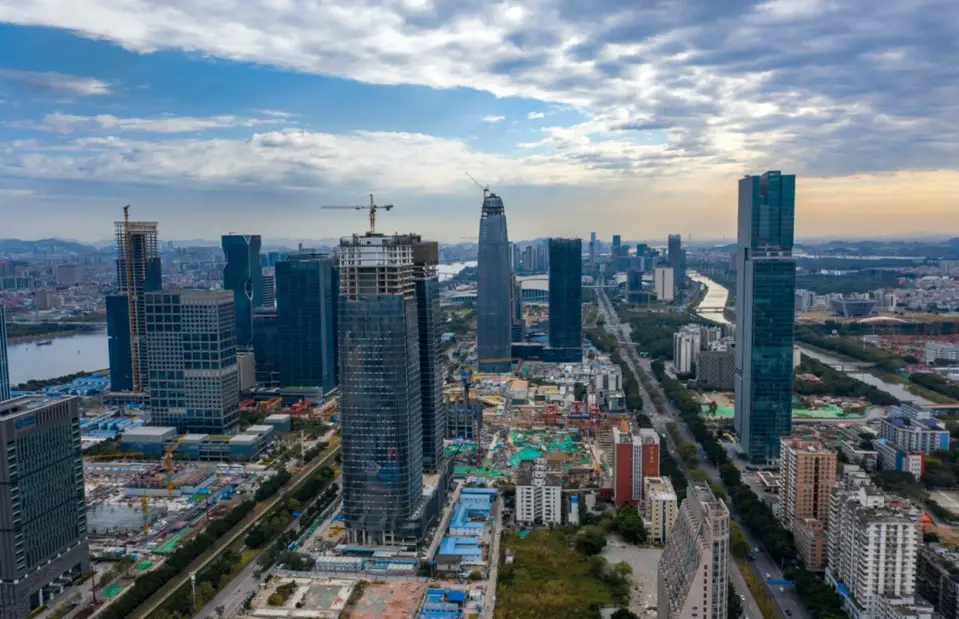
Photo taken on Jan. 9 shows Pazhou high-tech development zone in Guangzhou, capital of south China's Guangdong Province. (Photo by Wang Meiyan/People's Daily Online)
By Liu Shiyao, People's Daily
China's spending on basic research nearly doubled during the 13th Five-Year Plan period (2016-2020), said an official with the country's Ministry of Science and Technology (MOST) during a press conference held on Feb. 26.
Ye Yujiang, head of the Department of Basic Research at the MOST briefed the media about the development of China's basic research at the press conference.
He introduced that the development of the discipline demonstrated a good momentum and a number of major original results have been achieved, and the country also significantly increased investment in basic research, which nearly doubled during the past five years and is expected to exceed 150 billion yuan ($23.18 billion) in 2020.
Besides, the policies and systems which support basic R&D have been continuously improved, and important progress has been made in the construction of scientific research bases, he added.
Minister of Science and Technology Wang Zhigang told the press conference that China has systematically promoted basic research and achieved breakthroughs in core technologies in key areas. As a result, China's science and technology innovation capacity have increased significantly, he added. For the first time, investment in basic research accounted for more than 6 percent of spending on R&D.
Meanwhile, China has promoted the application of scientific and technological achievements in the development of the economy and society in an all-round manner, so as to foster "new growth drivers" for high-quality development, he remarked, adding that the number of high-tech enterprises has exceeded 200,000.
According to the MOST chief, China has also increased the pool of qualified scientific and technological personnel. Talent development of the country has been accelerated, which is indicated by its full-time equivalent of R&D personnel reaching 4.8 million man-years.
China has deepened reforms of the science and technology system in key areas and formed a "new ecology" for innovation and entrepreneurship, and actively joined the global innovation network, making new advances in scientific and technological cooperation, Wang said. Besides, the country has acted swiftly and tackled the scientific and technological difficulties in emergent response to the COVID-19 pandemic, making new contributions to the world's efforts to address common global challenges.
Wang stressed China will give full play to the supporting role of technological innovation during the 14th Five-Year Plan period (2021-2025). To promote the high-end development of the industrial chain, the country will step up to make breakthroughs in key technologies and intensify the arrangement of frontier technologies. It will also push forward the large-scale application of technological advances to support the development of the real economy.
In order to safeguard people's health and lives, the country is planning to enhance R&D and application in the prevention and treatment of major diseases, as well as innovative medicines and medical equipment, Wang introduced.
According to him, the country will also advance technological breakthroughs and promote their application in pollution prevention and control to realize its goals in peaking carbon dioxide emissions and achieving carbon neutrality.
Besides, to improve the overall efficiency of the innovative system, China will put emphasis on stimulating the vitality of talents and launch a new round of reforms in the scientific and technological system.
In the next five years, China will continue to support the development of Beijing, Shanghai, and the Guangdong-Hong Kong-Macao Greater Bay Area into international science and technology innovation centers. In addition, it will also support qualified regions to establish regional innovation centers and build sources for regional innovation.
Ye Yujiang, head of the Department of Basic Research at the MOST briefed the media about the development of China's basic research at the press conference.
He introduced that the development of the discipline demonstrated a good momentum and a number of major original results have been achieved, and the country also significantly increased investment in basic research, which nearly doubled during the past five years and is expected to exceed 150 billion yuan ($23.18 billion) in 2020.
Besides, the policies and systems which support basic R&D have been continuously improved, and important progress has been made in the construction of scientific research bases, he added.
Minister of Science and Technology Wang Zhigang told the press conference that China has systematically promoted basic research and achieved breakthroughs in core technologies in key areas. As a result, China's science and technology innovation capacity have increased significantly, he added. For the first time, investment in basic research accounted for more than 6 percent of spending on R&D.
Meanwhile, China has promoted the application of scientific and technological achievements in the development of the economy and society in an all-round manner, so as to foster "new growth drivers" for high-quality development, he remarked, adding that the number of high-tech enterprises has exceeded 200,000.
According to the MOST chief, China has also increased the pool of qualified scientific and technological personnel. Talent development of the country has been accelerated, which is indicated by its full-time equivalent of R&D personnel reaching 4.8 million man-years.
China has deepened reforms of the science and technology system in key areas and formed a "new ecology" for innovation and entrepreneurship, and actively joined the global innovation network, making new advances in scientific and technological cooperation, Wang said. Besides, the country has acted swiftly and tackled the scientific and technological difficulties in emergent response to the COVID-19 pandemic, making new contributions to the world's efforts to address common global challenges.
Wang stressed China will give full play to the supporting role of technological innovation during the 14th Five-Year Plan period (2021-2025). To promote the high-end development of the industrial chain, the country will step up to make breakthroughs in key technologies and intensify the arrangement of frontier technologies. It will also push forward the large-scale application of technological advances to support the development of the real economy.
In order to safeguard people's health and lives, the country is planning to enhance R&D and application in the prevention and treatment of major diseases, as well as innovative medicines and medical equipment, Wang introduced.
According to him, the country will also advance technological breakthroughs and promote their application in pollution prevention and control to realize its goals in peaking carbon dioxide emissions and achieving carbon neutrality.
Besides, to improve the overall efficiency of the innovative system, China will put emphasis on stimulating the vitality of talents and launch a new round of reforms in the scientific and technological system.
In the next five years, China will continue to support the development of Beijing, Shanghai, and the Guangdong-Hong Kong-Macao Greater Bay Area into international science and technology innovation centers. In addition, it will also support qualified regions to establish regional innovation centers and build sources for regional innovation.
 Menu
Menu
 China's spending on basic research nearly doubles during past five years
China's spending on basic research nearly doubles during past five years
















